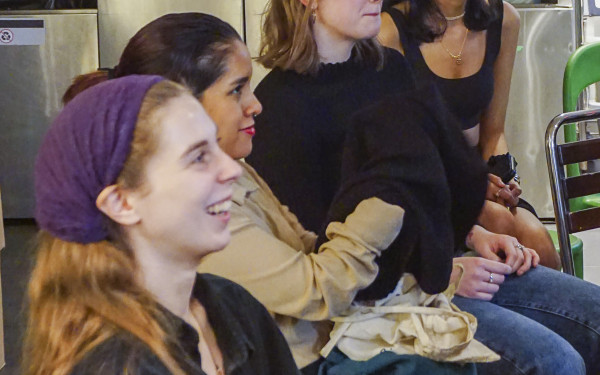Revitalizing Sicilian folk music
Blending Italian and English, Amanda Pascali translates centuries-old Sicilian folk songs and texts for a modern audience
Amanda Pascali writes music to translate and preserve old Sicilian folk songs.
While rooted in Italian tradition, her music transcends borders, telling a universal story of people living between cultures and languages.
Pascali is a bilingual musician based in Houston, Texas, who creates music that reflects the experiences of first-generation immigrants in America. She sings in Italian and English and pioneered the first comprehensive project to translate Sicilian folk songs into English, rewriting them for a modern audience and making them more accessible globally.
“As the daughter of two immigrants, I constantly felt too foreign for here, too foreign for home and never really enough for both,” Pascali said. “Music was the only space for me where I could actually see who I was, tell my story and really recount a snapshot of what it's like to grow up mixed in the southern part of the United States.”
On Feb. 21, Pascali performed at Folk Alliance International in Montreal, a non-profit that aims to keep the tradition of folk music thriving.
“This is an opportunity for musicians to connect,” said Addison Freeman, Pascali’s husband who performs alongside her on a traditional, Sicilian mandolin. “There are a lot of parallels with every type of art and a lot of stories and different cultures.”
Pascali’s music is largely inspired by her family’s roots. Her father, who has Italian heritage, was born in communist Romania and was thrown out of his home country for rebelling against the dictatorship. Pascali’s mother was born in Cairo, Egypt, but grew up in Paris, France. This background has led to music that mixes folk and Americana influences with Mediterranean, Balkan and Latin rhythms, which she has coined “Immigrant American Folk.”
“It’s hard to describe the uniqueness of her voice,” said Lauren Lira, an audience member and representative from Texas’s Kerrville Folk Festival. “I like to listen to all types of music and branch out, but I’ve never heard music like hers before. It’s very impactful, very touching, especially the song ‘Temporary Home.’ You could really feel it in your body.”
In 2023, Pascali earned a Fulbright Program fellowship, endorsed by the US State Department and the Italian Ministry of Foreign Affairs, to translate and revitalize Sicilian folk songs. She collaborated with the University of Messina and the University of Houston to translate songs by Rosa Balistreri, an Italian musician who sang about revolt, rebellion and social injustice in the latter half of the 20th century.
“I fell in love with her music,” Pascali said. “I thought people need to hear the songs about the mafia and the priests collaborating with each other. They need to hear these songs about the stories of victims of femicide. They need to hear stories about war and poverty and hunger that are still relevant today, although they were written long ago.”
Pascali explained that Sicily creates a crossroads of different cultures. She has always viewed it as a place that was never African enough for Africa and never European enough for Europe. Even geographically, it sits on two different tectonic plates: the African plate and the European plate.
According to the United Nations Educational, Scientific and Cultural Organization (UNESCO), Sicilian is considered a "vulnerable" language, meaning it is at risk of becoming endangered and could potentially die out if not actively preserved.
“I hope that my music encourages people to think about the full complexity of what it means to be a human being in a globalized world,” Pascali said. “And also, how similar we can be through music traditions—even though we may come from different countries—while singing songs that are ancient songs in the modern day.”
Pascali will release her new record, Roses and Basil, a collection of Sicilian-English translations and original music, in June 2025.


_600_832_s.png)




